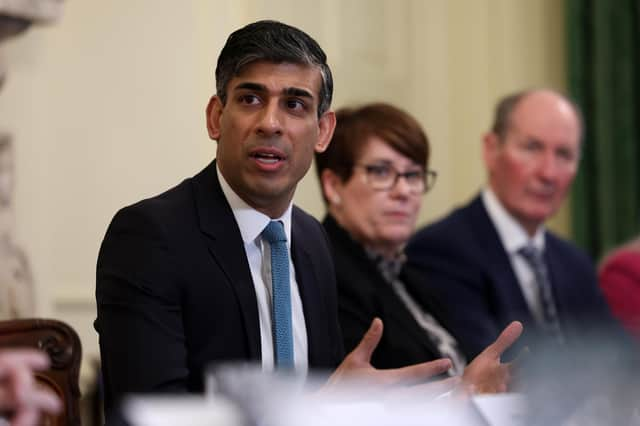Sunak's light relief as inflation stagnates, but darker clouds loom for UK economy


The rate of inflation - measured by the Consumer Prices Index - remained the same in January as the month before, and is twice the Bank of England’s target rate of 2 per cent, but still lower than the 4.2 per cent expected by many economists.
While the Prime Minister welcomed the news, saying the economy had “turned the corner”, his political joy is likely to be short-lived.
Advertisement
Hide AdAdvertisement
Hide AdThe Office for National Statistics is due to publish the GDP figures for December today, with many economists forecasting the UK is likely to slip into a recession, or at the very best achieve anaemic growth.
But yesterday Rishi Sunak labelled himself “unashamedly pro-business” as he delivered some short opening remarks to chief executives of his 2024 Business Council in Downing Street.
He acknowledged “global headwinds” affecting businesses, referencing disruption in the Red Sea – where violence by Houthi rebels has caused firms to redirect shipments – which is understood to be partly linked to recent tea supply issues.
But overall the Prime Minister was optimistic about the business sector.
Advertisement
Hide AdAdvertisement
Hide AdHowever Shadow Chancellor Rachel Reeves said: “After 14 years of economic failure, working people are worse off. Prices are still rising in the shops, with the average household’s costs up £110 a week compared to before the last election.
“Inflation is still higher than the Bank of England’s target and millions of families are struggling with the cost of living.
“The Conservatives cannot fix the economy because they are the reason it is broken. It’s time for change. Only Labour has a long-term plan to get Britain’s future back by delivering more jobs, more investment and cheaper bills.”
While the overall trend of food price inflation decreasing for the first time will be welcomed by those at Number 10 - and watched closely by the Bank of England, prices in the shops are still rising, and the headline rate conceals significant variations for different food types.
Advertisement
Hide AdAdvertisement
Hide AdThe 0.4 per cent decrease was the first since September 2021, with the cost of bread and cereals, cream crackers and chocolate biscuits falling, the ONS said.
While food and non-alcoholic beverage prices are still 7 per cent higher than a year ago, the category saw the slowest rate of increase since April 2022.
On a monthly basis, food and non-alcoholic beverage prices fell by 0.4% between December and January.
Most of this drop was down to a 1.3 per cent decrease in bread and cereal prices – the largest in that category since May 2021.
Advertisement
Hide AdAdvertisement
Hide AdThe ONS said seven out of 11 types of food and non-alcoholic beverages it tracks put downward pressure on the inflation figure last month.
Despite the most recent fall, food and non-alcoholic beverages are around 25 per cent more expensive than they were in January 2022. In the entire decade before that, prices only rose around 10 per cent.
ONS chief economist Grant Fitzner said: “Inflation was unchanged in January, reflecting counteracting effects within the basket of goods and services.
“The price of gas and electricity rose at a higher rate than this time last year due to the increase in the energy price cap, while the cost of second-hand cars went up for the first time since May.”
Comment Guidelines
National World encourages reader discussion on our stories. User feedback, insights and back-and-forth exchanges add a rich layer of context to reporting. Please review our Community Guidelines before commenting.
